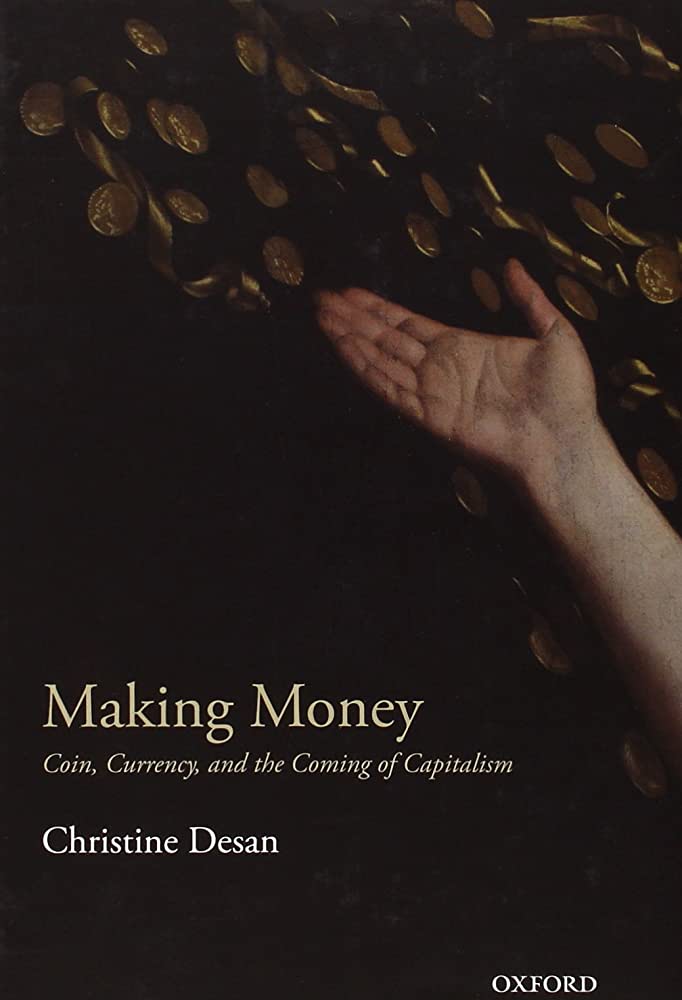
Since it appeared in 2014, Christine Desan’s book, Making Money: Coin, Currency, and the Coming of Capitalism (Oxford University Press, 2014) has captured the attention of legal and economic historians interested in some of the most foundational questions of the legal history of money. Desan argues that the way governments–and the people behind them–design money has had profound effect, not only on how people exchange money, but on the shape and rules of the marketplace. The book is sweeping in the truest sense of the word: ranging through five hundred years of history to uncover the constitutional nature of money and the ways in which money was both the subject and object of legal and political governance.
The book has been so influential that a few years ago, Law and History Review Associate Editor Jedidiah Kroncke and I began discussing the possibility of a scholarly forum that would explore Desan’s arguments from different perspectives. We weren’t immediately sure which scholars to turn to, but we did know we wanted to host this on The Docket, outside of any paywall, to try to reach as broad an audience as possible.
The indefatigable Jed Kroncke brought the project to fruition. Even with his duties as editor, professor, and scholar, he made the time to find three brilliant scholars who were interested in commenting on Desan’s book. He also managed to secure the thoughtful response by Desan. Elinor Aspegren, Law and History Review‘s Editorial Assistant, helped edit and format the submissions in the final stretch. The result, we believe, is an insightful and provocative exploration of one of the most important legal histories of our time. We thank Christine Desan, Katie A. Moore, Samuel Knafo, and Roy Kreitner for their outstanding contributions, and we look forward to the continued dialogue about Christine Desan’s Making Money.
-Gautham Rao, Editor-in-Chief, Law and History Review.
TABLE OF CONTENTS
Katie A. Moore, Unmaking the Myth of Barter:
Abstract: Katie A. Moore discusses how Desan, “as she beautifully illustrates the central role that politics and the law played in animating Anglo-Saxon monetary practice from the seventh century on,” problematizes the myth of the smooth evolution from barter to market exchange.
Katie A. Moore is an Assistant Professor of History at the University of California, Santa Barbara, where she teaches courses on early America and the Atlantic world.
****
Samuel Knafo, Revisiting the Origins of Modern Money:
Abstract: Samuel Knafo explains how Desan’s book “offers a powerful response to the liberal mythology that places the onus for the use of money on people’s confidence rather than the exercise of power on the part of the state.”
Samuel Knafo is a Reader in International Relations at the University of Sussex. He has published The Making of Modern Finance: the Gold Standard and the Rise of Liberal Governance. He currently works on central banking and the early history of financialization.
****
Roy Kreitner, Reenergizing Political Economy:
Abstract: Desan’s book teaches a valuable lesson–“that to understand finance, we have to master the internal logic and development of money.”
Roy Kreitner teaches courses on private law, legal history, and law and political thought at Tel-Aviv University’s Law School, where he has been on the faculty since 2001.
****
Christine Desan’s Response:
Abstract: “As the essays gathered here suggest, there are myriad avenues we need to illuminate; each helps us understand the space we organize when we make and maintain money. I hope that mapping money and its study makes that project more visible.”
Christine Desan is the Leo Gottlieb Professor of Law at Harvard Law School.

